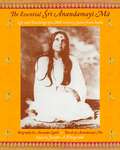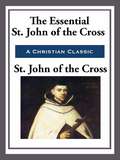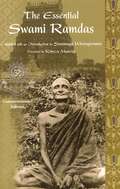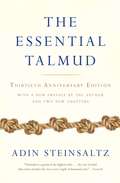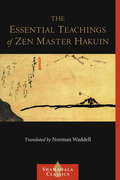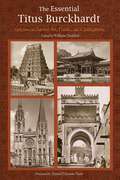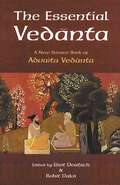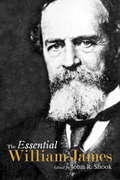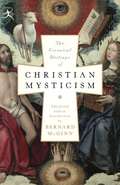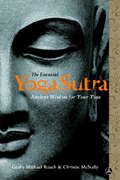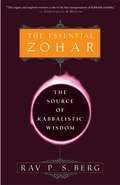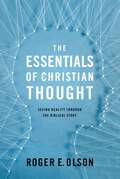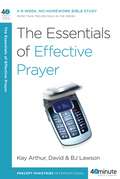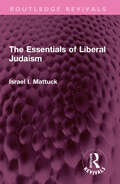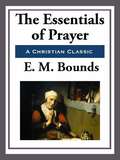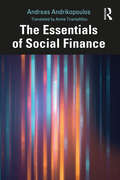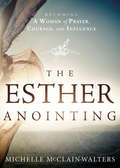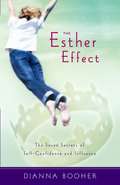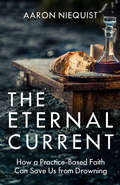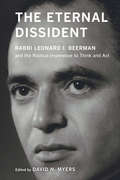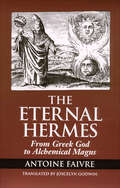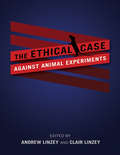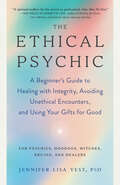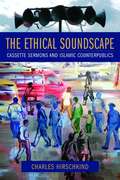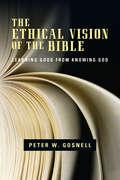- Table View
- List View
The Essential Sri Anandamayi Ma: Life and Teachings of a 20th Century Saint from India
by Anandamayi MaAnandamayi Ma has inspired millions of individuals of diverse faiths and circumstances—from Prime Ministers, artists, and industrialists to shopkeepers, beggars and monks including Mahatma Gandhi, Indira Gandhi, Jawarharlal Nehru, Former Prime Minister of Canada, Pierre Elliott Trudeau, the Queen Mother of Greece, and the Former President of India, Ragendra Prasad.
The Essential St. John of the Cross
by St. John of the CrossCollected here in this omnibus edition are all three of St. John of the Cross' major works as well as twenty of his magnificent poems. The Ascent of Mount Carmel is the third major work of St. John of the Cross and is considered to be the introductory work on mystical theology. Dark Night of the Soul is one of the greatest religious poems ever written. This masterpiece of Mystic Christianity examines faith and how to keep faith when all seems lost. Think of it as guide to making it through the dark night of the soul to the brighter, happier, faith filled tomorrow that awaits. In A Spiritual Canticle of the Soul and the Bridegroom Christ, St. John states: "I do not purpose here to set forth all that greatness and fullness the spirit of love, which is fruitful, embodies in it. Yes, rather it would be foolishness to think that the language of love and the mystical intelligence - and that is what these stanzas are - can be at all explained in words of any kind, for the Spirit of our Lord who helps our weakness."
The Essential Swami Ramdas
by Swami RamdasIn simple and eloquent language, Ramdas writes directly and from the heart and his message of certain deliverance through the unswerving remembrance of God is meant for all serious seekers of all religions.
The Essential Talmud
by Adin SteinsaltzThe Essential Talmud is a masterful introduction to the beliefs, attitudes, and methods of the sacred text by which the Jewish people have lived and survived through the ages-by the renowned Israeli rabbi, scholar, and teacher. Rabbi Steinsaltz is the first to capture the flavor and spirit of the Talmud as a human document and to summarize its main principles as an expression of divine law. This expanded edition features a new preface by the rabbi, a historical overview of life in the times of the Talmud, and an in-depth look at the content and appearance of the original Talmudic page. This seminal volume makes abundantly clear the importance of the Talmud in the lives of modern Jews. "This book is indispensable to those, Jews and Christians alike, who would like to gain an insight into what it is that moves the contemporary Jew. " (Rabbi Solomon S. Bernards, B'Nai B'rith Anti-Defamation League)REVIEW: "Offers a fascinating introduction to the codified oral tradition. " (Christianity Today)
The Essential Teachings of Zen Master Hakuin: A Translation of the Sokko-roku Kaien-fusetsu
by Norman Waddell Hakuin EkakuA fiery and intensely dynamic Zen teacher and artist, Hakuin (1685-1768) is credited with almost single-handedly revitalizing Japanese Zen after three hundred years of decline. As a teacher, he placed special emphasis on koan practice, inventing many new koans himself, including the famous "What is the sound of one hand clapping?" As an artist, Hakuin used calligraphy and painting to create "visual Dharma"--teachings that powerfully express the nature of enlightenment. The text translated here offers an excellent introduction to the work of this extraordinary teacher. Hakuin sets forth his vision of authentic Zen teaching and practice, condemning his contemporaries, whom he held responsible for the decline of Zen, and exhorting his students to dedicate themselves to "breaking through the Zen barrier." Included are reproductions of several of Hakuin's finest calligraphies and paintings.
The Essential Titus Burckhardt: Reflections on Sacred Art, Faiths, and Civilizations
by Titus BurckhartdAn introduction to the thought of one of the greatest perennialist authors of the twentieth century.
The Essential Vedanta: A New Source Book of Advaita Vedanta
by Eliot DeutschThis book will be of great interest to all students of Hinduism, students of both Eastern and Western philosophy, and spiritual seekers who wish to better understand this ancient Indian tradition of non-dualist thought.
The Essential William James
by John R. ShookWilliam James (1842-1910) was one of the most original and influential American thinkers of the late 19th and early 20th centuries. As a professor at Harvard University he published many works that had a wide-ranging impact on both psychology and philosophy. His Principles of Psychology was the most important English-language work on the mind since Locke's Essay Concerning Human Understanding. His Varieties of Religious Experience practically inaugurated the field of psychology of religion, and it also remains a major inspiration for philosophy of religion. Perhaps most importantly, James publicized the movement of pragmatism and supplied much of its powerful momentum. This book covers the primary topics for which James is still closely studied: the nature of experience; the functions of the mind; the criteria for knowledge; the definition of "truth"; the ethical life; and the religious life. His notable terms, still resonating in their respective fields, are all here, from the "stream of consciousness" and "pure experience" to the "will to believe," the "cash-value of truth," and the distinction between the religiously "healthy soul" and the "sick soul." This volume's eighteen selections receive the bulk of the attention and citation from scholars, provide excellent coverage of core topics, and have a broad appeal across many academic disciplines. This well-organized compilation of James's important writings offers an exciting and fascinating tour for both the casual reader and the dedicated student interested in philosophy, psychology, religious studies, American studies, or any related field.
The Essential Writings of Christian Mysticism
by Bernard McginnThis clear and comprehensive anthology, culled from the vast corpus of Christian mystical literature by the renowned theologian and historian Bernard McGinn, presents nearly one hundred selections, from the writings of Origen of Alexandria in the third century to the work of twentieth-century mystics such as Thomas Merton. Uniquely organized by subject rather than by author,The Essential Writings of Christian Mysticism explores how human life is transformed through the search for direct contact with God. Part one examines the preparation for encountering God through biblical interpretation and prayer; the second part focuses on the mystics' actual encounters with God; and part three addresses the implications of the mystical life, showing how mystics have been received over time, and how they practice their faith through private contemplation and public actions. In addition to his illuminating Introduction, Bernard McGinn provides accessible head notes for each section, as well as numerous biographical sketches and a selected bibliography. Praise for The Essential Writings of Christian Mysticism "No one is better equipped than Bernard McGinn to provide a thorough and balanced guide to this vast literature.... This is an anthology which deserves to be read not only by those who study Christian history and theology, but by believers who long to deepen their own lives of prayer and service. "
The Essential Yoga Sutra: Ancient Wisdom for Your Yoga
by Geshe Michael Roach Lama Christie McnallyThe Yoga Sutra of Patanjali is a classic Sanskrit treatise consisting of 195 "threads," or aphorisms, describing the process of liberation through yoga. Although little is known about Patanjali (most scholars estimate that he lived in India circa 200-300 b.c.), his writings have long been recognized as a vital contribution to the philosophy and practice of yoga. This new, expert translation of the original Sanskrit text of Patanjali's best-known work presents his seminal ideas and methods in accessible, plain-language English. Patanjali organized the sutra into four parts: Samadhi (absorption), Sadhana (practice), Vibhuti (supernatural powers), and Kaivalya (liberation). Each represents a step in breaking free of our limited definition of consciousness and training the mind to achieve oneness with the universe. Geshe Michael Roach, one of the most respected teachers of Tibetan Buddhism in America and a renowned scholar of Sanskrit, provides authoritative commentary on each of the sutras. His notes and clarification are straightforward and highly readable, untainted by obscure, academic terminology or New Age jargon. The first edition of the Yoga Sutra to present a Buddhist perspective, this paperback original will be welcomed by students and spiritual seekers alike.From the Trade Paperback edition.
The Essential Zohar: The Source of Kabbalistic Wisdom
by Rav P. S. Berg Philip S. BergFor thousands of years, no book has been more shrouded in mystery than the Zohar, yet no book offers us greater wisdom. The central text of Kabbalah, the Zohar is a commentary on the Bible's narratives, laws, and genealogies and a map of the spiritual landscape. In The Essential Zohar, the eminent kabbalist Rav P. S. Berg decodes its teachings on evil, redemption, human relationships, wealth and poverty, and other fundamental concerns from a practical, contemporary perspective. The Zohar and Kabbalah have traditionally been known as the world's most esoteric sources of spiritual knowledge, but Rav Berg has dedicated his life to making this concentrated distillation of infinite wisdom available to people of all faiths so that we may use its principles to live each day in harmony with the divine.
The Essentials of Christian Thought: Seeing Reality through the Biblical Story
by Roger E. OlsonChristians disagree on doctrine, politics, church government, certain moral questions—just about everything under the sun, it can seem. Yet a unity remains, centered around a core outlook on God and the world that is common to all believers. Or at least, such an outlook should unite Christians of all theological and church backgrounds. However, alternate visions of reality often infect and corrupt Christians’ thinking. In The Essentials of Christian Thought, eminent theologian and church historian Roger Olson outlines the basic perspective on the world that all Christians, regardless of the place and time in which they are born, have historically held. This underlying metaphysic accords with all orthodox theologies, whether Calvinist or Arminian, Roman Catholic, Eastern Orthodox, or Protestant, but it separates Christianity from other religious and secular perspectives. It is, quite simply, the essential requirement of a Christian view of the world. Bold and incisive, The Essentials of Christian Thought will prompt thoughtful readers and students to more consciously appropriate the core of their faith, guarding against ideas that subtly but necessarily invite compromise.
The Essentials of Effective Prayer (40-Minute Bible Studies)
by Kay Arthur David Lawson B. J. LawsonCan You Know for Certain God Hears Your Prayers? Do you sometimes wonder if God hears-let alone answers-your prayers? Do you ask yourself, What's the point of praying? Do you long to experience the power of prayer in your daily life? Find the keys to an effective prayer life in this compelling study that explores both God's expectations of you and His promises to you when it comes to prayer. Through a detailed examination of the Lord's Prayer and other examples of prayer throughout the Bible, you'll discover a model for talking with God. You'll also learn key principles of prayer and gain a deeper understanding of how prayer can draw you closer to His heart.
The Essentials of Liberal Judaism (Routledge Revivals)
by Israel I. MattuckFirst published in 1947 The Essentials of Liberal Judaism explores the fundamental ideas of liberal Judaism. Rabbi Israel Mattuck explains that liberal Judaism is concerned not only with the question, where shall we find the teachings of Judaism, but also with the question, how shall we find them? He discusses important themes like conception of God in Judaism; grounds for the belief in God; problem of evil; guidance of God in human history; sin, repentance and atonement; Judaism and the social order; liberal Judaism and orthodox Judaism; differences between Judaism and Christianity and what it means to be a Jew, to argue that it is the fundamental principle of liberal Judaism that Judaism is a developing religion. This book is a must read for scholars of Judaism, history of Judaism, and religion.
The Essentials of Prayer
by E. M. BoundsEdward Bounds, an American lawyer and pastor, wrote nine books in his lifetime, seven of which were about prayer. Known as a veritable powerhouse of spiritual maturity, Bounds has affected the prayer lives of thousands of people. This volume, Essentials of Prayer, focuses on the proper mindset believers must attain in order to have the best prayer life. He reminds readers that one must have a humble heart and undivided allegiance to God in order to pray effectively. He also believes strongly that prayer is available to all people -- even those who only come in times of trouble. His advice is intended for both personal and corporate prayer, and is a great help for serious meditation.
The Essentials of Social Finance
by Andreas AndrikopoulosThe Essentials of Social Finance provides an interesting, accessible overview of this fascinating ecosystem, blending insights from finance and social entrepreneurship. It highlights the key challenges facing social finance, while also showcasing its vast opportunities. Topics covered include microfinance, venture philanthropy, social impact bonds, crowdfunding, and impact measurement. Case studies are peppered throughout, and a balance of US, European, Asian, and Islamic perspectives are included. Each chapter contains learning objectives, discussion questions, and a list of key terms. There is also an appendix explaining key financial concepts for readers without a background in the subject, as well as downloadable PowerPoint slides to accompany each chapter. This will be a valuable text for students of finance, investment, social entrepreneurship, social innovation, and related areas. It will also be useful to researchers, professionals, and policy-makers interested in social finance.
The Esther Anointing: Becoming a Woman of Prayer, Courage, and Influence
by Michelle McClain-WaltersBe inspired by Esther, an incredible woman of God. Esther was willing to risk her life for the welfare of her people and the furthering of God’s plan. Strategically positioned by God in a place of influence, Esther is a powerful biblical example of how God can use anyone. She answered God’s call and went through a season of preparation physically and spiritually to get ready. Just like in biblical times, God is positioning women today and giving them divine opportunities to influence the culture for His glory. The Esther Anointing gives you the keys to Esther’s success, including the qualities that make women great, the power of influence, and the key to finding God’s favor for your assignment. It doesn’t matter where you came from or what skills and talents you have; if you let Him, God can use your life for His glory!
The Esther Effect
by Dianna BooherUsing the story of Esther as a backdrop, Booher explores components of self-esteem and shares how a Christian's sense of self should be rooted in a relationship with God. Ultimately we can live passionately and influence others for God's kingdom.
The Eternal Current: How a Practice-Based Faith Can Save Us from Drowning
by Aaron NiequistA call for Christians to move past the shallows of idealized beliefs and into a deeper, more vibrant, beatitude-like faith rooted in sacred practices and intimate experiences with God.When the limits of his own faith experience left him feeling spiritually empty, Niequist determined God must have a wider vision for worship and community.In his search, Aaron discovered that there was historical Christian precedent for enacting faith in a different way, an ancient and now future way of believing. He calls this third way "practice-based faith." This book is about loving one's faith tradition and, at the same time, following the call to something deeper and richer. By adopting some new spiritual practices, it is possible to learn to swim again with a renewed sense of vigor and divine purpose.
The Eternal Dissident: Rabbi Leonard I. Beerman and the Radical Imperative to Think and Act
by David N. MyersA free ebook version of this title is available through Luminos, University of California Press’s Open Access publishing program. Visit www.luminosoa.org to learn more.The Eternal Dissident offers rare insight into one of the most inspiring and controversial Reform rabbis of the twentieth century, Leonard Beerman, who was renowned both for his eloquent and challenging sermons and for his unrelenting commitment to social action. Beerman was a man of powerful word and action—a probing intellectual and stirring orator, as well as a nationally known opponent of McCarthyism, racial injustice, and Israeli policy in the occupied territories. The shared source of Beerman’s thought and activism was the moral imperative of the Hebrew prophets, which he believed bestowed upon the Jewish people their role as the “eternal dissident.” This volume brings Beerman to life through a selection of his most powerful writings, followed by commentaries from notable scholars, rabbis, and public personalities that speak to the quality and ongoing relevance of Beerman’s work.
The Eternal Hermes: From Greek God to Alchemical Magus
by Antoine FaivreFrom the Western esotericism pioneer, a “work of lucid scholarship [that reveals] the full range of Hermes’ innumerable manifestations in European history” (Parabola).Hermes—the fascinating, mercurial messenger of the gods, eloquent revealer of hidden wisdom, and guardian of occult knowledge—has played a central role in the development of esotericism in the West. Drawing upon many rare books and manuscripts, this highly illustrated work explores the question of where Hermes Trismegistus came from, how he came to be a patron of the esoteric traditions, and how the figure of Hermes has remained lively and inspiring to our own day.“Great erudition blended with a highly refined metaphysical sensibility brings the great Hermes to life and allows this powerful psychospiritual archetype to speak once again [and perhaps even play a few much-needed tricks on us].” —Jacob Needleman, author of The Heart of Philosophy“Faivre’s remarkable achievement in this single volume is to combine the historical richness of the Hermetic tradition with its relevance to understanding the circumambulations of the psyche today as it pursues its spiritual quest.” —June Singer, author of Boundaries of the Soul“This book is an impressive and compelling contribution to the puzzling question of both the source and perdurance of Hermes in his variety of shape-shifting guises. From Alexandria to Amsterdam, Athens to America, this thrice-great Hermes keeps showing up, perhaps even more than in antiquity!” —David L. Miller, author of The New Polytheism
The Ethical Case against Animal Experiments
by Andrew Linzey Clair LinzeyAt present, human beings worldwide are using an estimated 115.3 million animals in experiments ”a normalization of the unthinkable on an immense scale. In terms of harm, pain, suffering, and death, animal experiments constitute one of the major moral issues of our time. Given today's deeper understanding of animal sentience, we must afford animals a special moral consideration that precludes their use in experiments. The Ethical Case against Animal Experiments begins with a groundbreaking and comprehensive ethical critique of the practice of animal experiments by the Oxford Centre for Animal Ethics. A second section offers original writings that engage with, and elaborate on, aspects of the Oxford Centre report. The essayists explore historical, philosophical, and personal perspectives that range from animal experiments in classical times to the place of necessity in animal research to one researcher's painful journey from researcher to opponent. A devastating look at a contemporary moral crisis, The Ethical Case against Animal Experiments melds logic to compassion to mount a powerful challenge to human cruelty.
The Ethical Psychic: A Beginner's Guide to Healing with Integrity, Avoiding Unethical Encounters, and Using Your Gifts for Good
by Jennifer Lisa VestA 101 guide for psychics and energy workers to build an authentic, equitable, and culturally sensitive healing practice, written by Afro-Indigenous intuitive, scholar, and healer Dr. Jennifer Lisa Vest.Being an ethical psychic means being of service--and learning how to navigate the thorny issues and unique risks inherent to intuitive work. From knowing your boundaries and limitations--and respecting those of your clients--to resisting the temptation of the guru lifestyle, The Ethical Psychic offers 7 critical guiding principles for grounded, ethical practice. Intuitive, philosopher, and ethicist Dr. Jennifer Lisa Vest, PhD, explores why (and how) energy workers must be of service, authentic, and self-aware; learn from their mistakes; embody sensitivity to client needs; be humble; and listen to a higher source. With training in African American Hoodoo, Native American Sweatlodge, Jamaican Revivalism, Trinidadian Shango, Spiritualism, Reiki, Pranic Healing, and other traditions, Dr. Vest is uniquely positioned to address readers&’ most common and pressing questions, like: How do I avoid crossing boundaries? What if I&’m making things worse? What privacy considerations do I need to think about? How can I be financially ethical? How do I avoid appropriation? What do I need to know about working with spirits? A go-to-guide for any medium, spirit worker, psychic, or aspiring Reiki master, The Ethical Psychic helps readers become the grounded and effective healers they were born to be.
The Ethical Soundscape: Cassette Sermons and Islamic Counterpublics
by Charles HirschkindCharles Hirschkind's unique study explores how a popular Islamic media form - the cassette sermon - has profoundly transformed the political geography of the Middle East over the last three decades. An essential aspect of what is now called the Islamic Revival, the cassette sermon has become omnipresent in most Middle Eastern cities, punctuating the daily routines of many men and women. Hirschkind shows how sermon tapes have provided one of the means by which Islamic ethical traditions have been recalibrated to a modern political and technological order - to its noise and forms of pleasure and boredom, but also to its political incitements and call for citizen participation. Contrary to the belief that Islamic cassette sermons are a tool of militant indoctrination, Hirschkind argues that sermon tapes serve as an instrument of ethical self-improvement and as a vehicle for honing the sensibilities and affects of pious living. Focusing on Cairo's popular neighborhoods, Hirschkind highlights the pivotal role these tapes now play in an expanding arena of Islamic argumentation and debate - what he calls an "Islamic counterpublic." This emerging arena connects Islamic traditions of ethical discipline to practices of deliberation about the common good, the duties of Muslims as national citizens, and the challenges faced by diverse Muslim communities around the globe. The Ethical Soundscape is a brilliant analysis linking modern media practices of moral self-fashioning to the creation of increasingly powerful religious publics.
